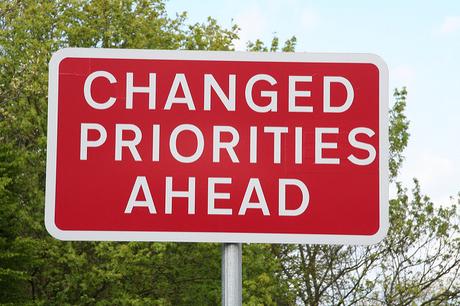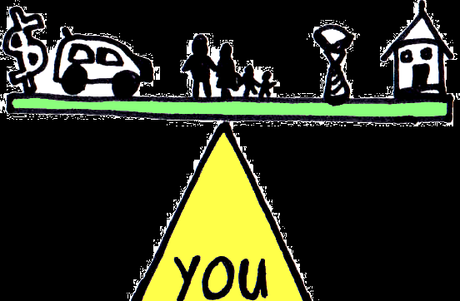
Covid-19 was the ultimate confirmation of the irreplaceable need to have someone in one's life who puts their arms around you and says, "You have me." Schools and daycare centers shut, people lost jobs or started to work from home, public events were canceled-and parents and children suddenly found themselves living in a world where family connection and love were once again realized as the normal way of doing things and not something for which we had to carve out time from our overscheduled days.
We weren't going out to eat. We weren't going to work. Family mealtimes were reinstated or perhaps discovered for the first time. After-school sports, camps, and activities went away. Instead, families biked together and took walks in the evenings. For many parents it was the first time in years of "balancing" work life and home life where-unequivocally-home life won out, if only by grudging default.
Together Again - For The First Time
Many parents began to experience what my wife Genie and I took for granted as self-employed people working from home who had been doing full-time grandchild-care for twelve years, before the pandemic hit. Before the pandemic we childcare-giving grandparents were a quaint anomaly. After the pandemic hit parents we know were home with their kids for the first time full time.
The ironies multiplied. It wasn't just family togetherness that was forced on tens of millions of Americans. The virus did more in a matter of weeks to cut carbon emissions than all the talk about climate change had accomplished in half a century. Global greenhouse gas emissions plunged 8 percent in 2020, the largest drop ever recorded, as worldwide lockdowns to fight the coronavirus triggered an unprecedented decline in the use of fossil fuels. Even roadkill deaths dropped.
Not since the day after 9/11 were the skies so clear and bare of jet trails. Birdsong could be heard in the airspace now free of the constant drone of engines. Flights were canceled by the tens of thousands. Roads were empty. China vastly reduced its pollution as factories powered by coal-fired plants temporarily closed. The resulting change in air quality was visible from space. Above all we began to change our ideas about our priorities.

Lessons
As my friend Johanna (José) Zeilstra, CEO of Gender Fair (an advocacy organization asking companies to do more and do better when it comes to equality and diversity), put it in an email to me: "The pandemic taught us valuable lessons- mostly good." She and I concocted these list about changed sensibilities:
In the light of the pandemic what is in?
- 1. Family dinners
- 2. Pets
- 3. Finding enjoyment in simple pleasures-locally
- 4. Flexible work arrangements/work-life balance/remote
- 5. Care about community/elderly
- 6. Healthcare for all
- 7. Importance of teachers and healthcare workers
- 8. Stakeholder capitalism-purpose-driven organizations
- 9. Global connectivity
- 11. Correcting racial injustice
What's out?

Out of Sync
Evidence that we've not been in sync with our evolutionary roots is not hard to find. Almost every day before and after the pandemic, many of us found ourselves reading yet another opinion piece underlining the fact that our utilitarian values were out of sync with our need to connect, love, and be loved. As the sociologist Jamie K. McCallum notes in Worked Over: How Round-the-Clock Work Is Killing the American Dream, Americans work too long and too hard, while others lack consistency in their hours and schedules. "Work hours declined for a century through hard-fought labor-movement victories, but they've increased significantly since the seventies. Americans have fewer paid holidays than workers in other countries, and the United States is all but alone in having no guaranteed maternity leave and no legal right to sick leave or vacation time."
Before the pandemic we were told to love work! We were led to believe that working hard will pay off. A well-established cottage industry goaded us to find our meaning in work, as if work were a family, or a religion, or a revelation given by God.
But the work-driven life has not met our needs. As Kim Brooks, author of Small Animals: Parenthood in the Age of Fear wrote in the New York Times, in "Feminism Has Failed Women-If the Pandemic Undid Three Decades of Progress on Gender Equality, One Has to Wonder: How Real Was That Progress in the First Place?" (December 23, 2020):
"The pandemic made visible what's been hidden: what many mothers and child specialists . . . have long sensed but aren't supposed to say: that whether the primary caretaker is a mother, a father, an extended family member or a close friend, newborns and infants do better in our homes. We don't talk about this, we barely acknowledge it, because if we did, we'd have a moral obligation to provide financial support to make it possible for all babies. We'd have to acknowledge the social value of infant care and child rearing and empower parents to provide that care in the way they think is best for their children."

Some Lessons
Brooks writes that Covid taught some startling lessons. For instance, that in the United States the survival rate of infants, "the most dependent age group of all, has gone way up during the pandemic. There are reports that premature births, one leading cause of infant mortality, fell significantly in the early months of lockdowns, when women in their final trimester of pregnancy were able to do something many of them cannot afford to do in normal times: Stay home from work."
Was a deity, perhaps, sending us a message with the pandemic, as a condemnation of our failures? Perhaps. But there was certainly a "memo" of sorts delivered to us something like this: While experts noted that the lockdowns wouldn't last forever, many expressed hope that they might reveal some of the benefits of switching to cleaner energy, less travel, and more care for our planet and for each other and our children. From this new vantage point, many of us besides Kim Brooks found ourselves reconsidering the notion of genuine work-life balance and understanding, perhaps for the first time, that seeking deep relationship-based fulfillment is a lot more joy producing than any job or career success can ever be.
This guest post was authored by Frank Schaeffer
Frank Schaeffer is a New York Times bestselling author of more than a dozen fiction and nonfiction books, including Crazy for God and Keeping Faith: A Father Son Story about Love and the United States Marine Corps. Frank's three semi-biographical novels about growing up in a fundamentalist mission, Portofino, Zermatt and Saving Grandma, have a worldwide following and have been translated into nine languages.In his new book, Fall in Love, Have Children, Stay Put, Save the Planet, Be Happy, Frank offers a passionate political, social, and lifestyle "blueprint" for changes that millions of us know are needed to rebalance our work lives with thriving relationships. Visit his website at: lovechildrenplanet.com.

Ms. Career Girl was started in 2008 to help ambitious young professional women figure out who they are, what they want and how to get it.

